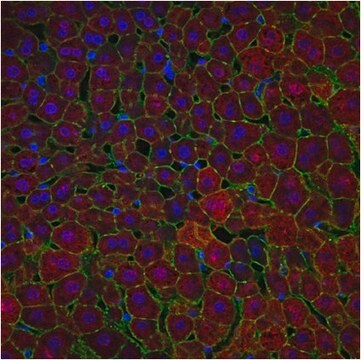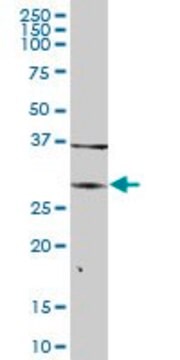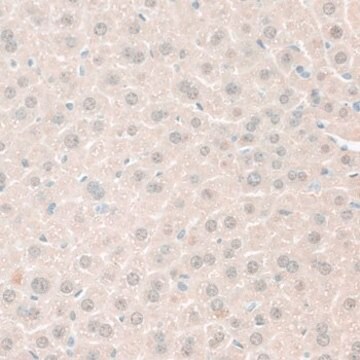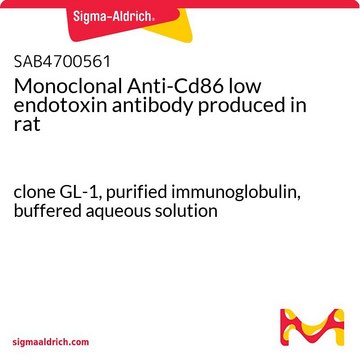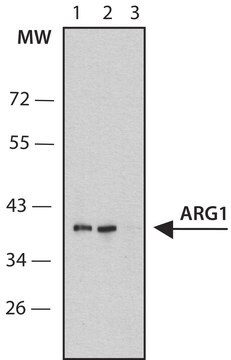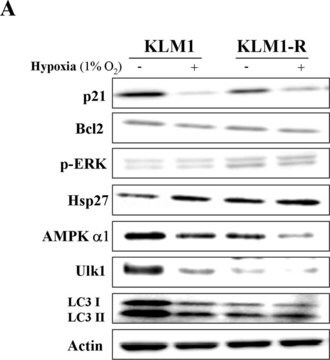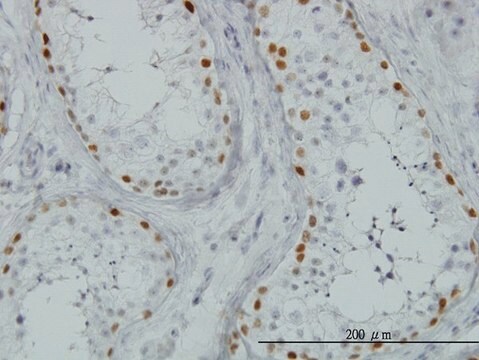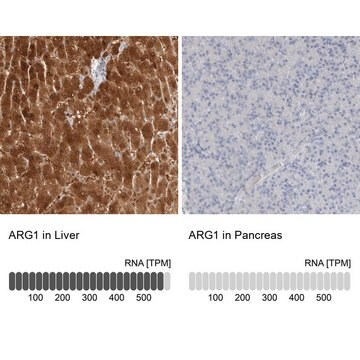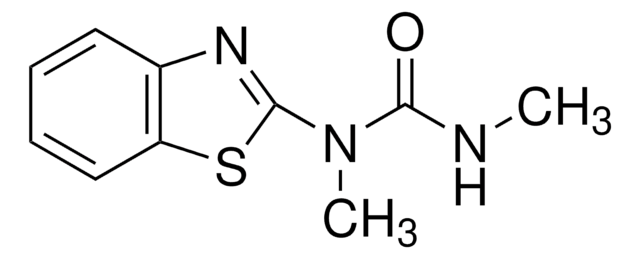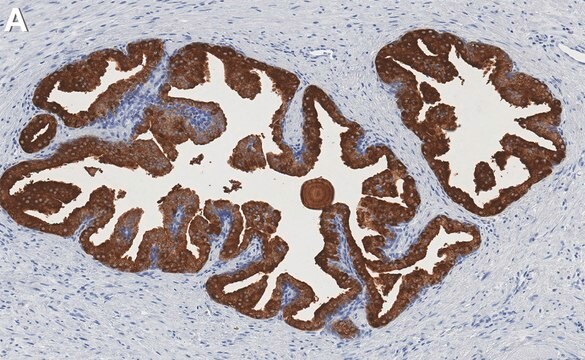추천 제품
생물학적 소스
rabbit
Quality Level
결합
unconjugated
항체 형태
IgG fraction of antiserum
항체 생산 유형
primary antibodies
클론
polyclonal
형태
buffered aqueous solution
분자량
35 kDa
종 반응성
dog, human
농도
0.5 mg - 1 mg/mL
기술
immunohistochemistry: suitable
western blot: suitable
NCBI 수납 번호
UniProt 수납 번호
배송 상태
wet ice
저장 온도
−20°C
타겟 번역 후 변형
unmodified
유전자 정보
human ... ARG1(383)
일반 설명
Arginase 1 (Arginase, liver) is a liver enzyme that completes the urea cycle in mammals by producing urea, which can be excreted, and L-ornithine through the hydrolysis of L-arginine. Defects in arginase 1 activity lead to a metabolic condition of hyperargininemia.
특이성
Anti-ARG1 (AB2) antibody reacts with bovine, human, rabbit, pig, canine, mouse, and rat arginase-1 enzymes.
면역원
Synthetic peptide directed towards the C terminal region of human ARG1
애플리케이션
Anti-ARG1 (AB2) antibody is used to tag arginase 1 proteins for detection and quantitation by Western blotting and in cells and tissues by immunohistochemical (IHC) techniques. It is used as a probe to study the role of arginase-1 in the management of nitrogen balance within mammalian cells.
생화학적/생리학적 작용
Arginase catalyzes the hydrolysis of arginine to ornithine and urea. The type I isoform of ARG1, is a cytosolic enzyme and expressed predominantly in the liver as a component of the urea cycle. Inherited deficiency of this enzyme results in argininemia, an autosomal recessive disorder characterized by hyperammonemia.Arginase catalyzes the hydrolysis of arginine to ornithine and urea. At least two isoforms of mammalian arginase exist (types I and II) which differ in their tissue distribution, subcellular localization, immunologic crossreactivity and physiologic function. The type I isoform encoded by this gene, is a cytosolic enzyme and expressed predominantly in the liver as a component of the urea cycle. Inherited deficiency of this enzyme results in argininemia, an autosomal recessive disorder characterized by hyperammonemia.Arginase catalyzes the hydrolysis of arginine to ornithine and urea. At least two isoforms of mammalian arginase exist (types I and II) which differ in their tissue distribution, subcellular localization, immunologic crossreactivity and physiologic function. The type I isoform encoded by this gene, is a cytosolic enzyme and expressed predominantly in the liver as a component of the urea cycle. Inherited deficiency of this enzyme results in argininemia, an autosomal recessive disorder characterized by hyperammonemia.
서열
Synthetic peptide located within the following region: LDIMEVNPSLGKTPEEVTRTVNTAVAITLACFGLAREGNHKPIDYLNPPK
물리적 형태
Purified antibody supplied in 1x PBS buffer with 0.09% (w/v) sodium azide and 2% sucrose.
면책조항
Unless otherwise stated in our catalog or other company documentation accompanying the product(s), our products are intended for research use only and are not to be used for any other purpose, which includes but is not limited to, unauthorized commercial uses, in vitro diagnostic uses, ex vivo or in vivo therapeutic uses or any type of consumption or application to humans or animals.
적합한 제품을 찾을 수 없으신가요?
당사의 제품 선택기 도구.을(를) 시도해 보세요.
Storage Class Code
10 - Combustible liquids
WGK
WGK 3
Flash Point (°F)
Not applicable
Flash Point (°C)
Not applicable
시험 성적서(COA)
제품의 로트/배치 번호를 입력하여 시험 성적서(COA)을 검색하십시오. 로트 및 배치 번호는 제품 라벨에 있는 ‘로트’ 또는 ‘배치’라는 용어 뒤에서 찾을 수 있습니다.
Naohiko Nakamura et al.
BMC cancer, 19(1), 621-621 (2019-06-27)
Noninvasive biomarkers are urgently needed for optimal management of nonalcoholic fatty liver disease (NAFLD) for the prevention of disease progression into nonalcoholic steatohepatitis (NASH) and hepatocellular carcinoma (HCC). In order to identify the biomarkers, we generated the swine hepatocellular carcinoma
Ewa Zajac et al.
Blood, 122(25), 4054-4067 (2013-11-01)
A proangiogenic function of tissue-infiltrating monocytes/macrophages has long been attributed to their matrix metalloproteinase-9 zymogen (proMMP-9). Herein, we evaluated the capacity of human monocytes, mature M0 macrophages, and M1- and M2-polarized macrophages to induce proMMP-9-mediated angiogenesis. Only M2 macrophages induced
Katarina Milosevic et al.
International journal of molecular sciences, 23(7) (2022-04-13)
Neuroinflammation and microglial activation, common components of most neurodegenerative diseases, can be imitated in vitro by challenging microglia cells with Lps. We here aimed to evaluate the effects of agmatine pretreatment on Lps-induced oxidative stress in a mouse microglial BV-2
Ángela VinuÉ et al.
Translational research : the journal of laboratory and clinical medicine, 203, 31-48 (2018-09-04)
Previous studies indicate a role of CDKN2A/2B/2BAS genes in atherosclerosis and type 2 diabetes mellitus (T2DM). Progression of these diseases is accompanied by T-cell imbalance and chronic inflammation. Our main objective was to investigate a potential association between CDKN2A/2B/2BAS gene
Marija Jakovljevic et al.
Frontiers in neuroscience, 13, 410-410 (2019-05-21)
Purinergic signaling is critically involved in neuroinflammation associated with multiple sclerosis (MS) and its major inflammatory animal model, experimental autoimmune encephalomyelitis (EAE). Herein, we explored the expression of ectonucleoside triphosphate diphosphohydrolase1 (NTPDase1/CD39) in the spinal cord, at the onset (Eo)
자사의 과학자팀은 생명 과학, 재료 과학, 화학 합성, 크로마토그래피, 분석 및 기타 많은 영역을 포함한 모든 과학 분야에 경험이 있습니다..
고객지원팀으로 연락바랍니다.